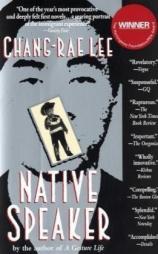Reading Group Guide
Discussion Questions
Native Speaker

1. As you review the list Lelia compiles of who Henry is (p. 5), which descriptions strike you as the most accurate? The most disturbing? The hardest for Lelia to accept? What characterization might you add to the list yourself? What does Lelia mean by the accusation scribbled on the scrap piece of paper under their bed: "False speaker of language" (p. 6)? Why could this be considered Henry's greatest fault, and his greatest transgression against his wife? How is it possible that a man who "on paper, by any known standard, was an impeccable mate" (pp. 160-161) could be failing his wife so miserably?
2. How does Dr. Luzan unknowingly break down the surface "opacity" (p. 133) Henry has acquired through his experience of working with Hoagland? Would a subject other than an older Asian male have had the same unsettling effect on Henry? How does this assignment begin the process of eroding Henry's professional commitment and confidence? Explain what Henry means when he says, "I can no longer simply flash a light inside a character, paint a figure like Kwang with a momentary language" (p. 206).
3. The adult Henry recalls of his childhood: "My self-conception was that I was frail" (p. 135). Why, despite Henry's intense emotional involvement with his father, does he identify so strongly with his mother? What is his mother afraid of, and how does she transmit that fear to her son?
4. How do Lelia and Henry each react to Mitt's death? What do their different responses reveal about their characters? To what degree are their reactions based on personality and what degree are they based on each character's cultural background? Who or what does each parent believe is to blame for this tragic occurrence?
5. On rare occasions, Henry addresses the reader directly, as "you," for example: "We will learn every lesson of accent and idiom, we will dismantle every last pretense and practice you hold, noble as well as ruinous. You can keep nothing safe from our eyes and ears. This is your own history. We are your most perilous and dutiful brethren, the song of hearts at once furious and sad" (p. 320). What emotions prompt Henry to speak pointedly to the novel's reader? What was your reaction to this passage from the book? Why do you think the author employs this device? Why does he use it so seldom?
6. What do you think Henry means when he says of his colleagues Grace and Pete, "We are friends in the way people in an unprovisioned lifeboat are" (p. 319)? Does he agree with Jack, who believes that all of Hoagland's employees are a family? Why does Henry feel indifferent to whether Jack betrays him? At the novel's conclusion, does Henry feel, as his father did, that the only family is one of blood?
7. In the early phase of Henry's employment at Hoagland's firm, why does Henry believe he has "finally found [his] truest place in the culture" (p. 127)? How do Henry's working under cover and exploiting his own people constitute "the darkest version of what [his immigrant father] only dreamed of" (p. 334)? How does Henry's spy career function in the novel as a metaphor for cultural assimilation?
8. What are the major similarities between Kwang and Henry's father? What are their major differences? Why are these two men tightly intertwined in Henry's mind and heart? What does Henry unexpectedly come to see in Kwang, which Henry "will search out now for the long remainder of [his] days" (p. 141)?
9. Henry's attitudes toward his Korean heritage are complex and conflicted. How do they affect his feelings about having a son of mixed blood? Which aspects of his father's emotional legacy does Henry hope will live on in himself and in Mitt? Which of his family's characteristics does he feel would be better off "diluted" in his offspring? Why does Henry feel that Mitt was blessed to have had Leila's genes and her daily emotional influence in his life?
10. At the novel's conclusion, why does Henry appear to derive joy from his position assisting Lelia? How does her approach to speech therapy differ from the lessons Henry was taught as a child (see p. 233)? How has Lelia's life with Henry and Mitt influenced the way she relates to her students?
Native Speaker
- Publication Date: March 1, 1996
- Genres: Fiction
- Paperback: 349 pages
- Publisher: Riverhead Trade
- ISBN-10: 1573225312
- ISBN-13: 9781573225311








